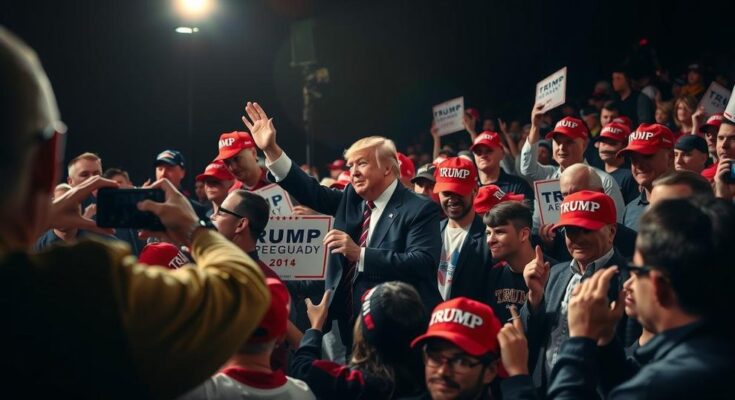Former President Trump has intensified efforts to cast doubt on Pennsylvania’s electoral integrity, making unsubstantiated claims of cheating during a rally and social media posts. Despite election officials identifying issues as part of their legitimate investigations, Trump claims large-scale fraud is occurring. This trend of misinformation reflects wider concerns about the integrity of elections and the challenges officials face in maintaining public trust during the electoral process.
In a concentrated effort to sow distrust regarding the electoral process, former President Donald Trump has intensified his focus on Pennsylvania, which is anticipated to play a pivotal role in the upcoming election. During a rally in Allentown, he claimed, “They’ve already started cheating!” amidst increasing concerns from election officials who are actively combating the spread of false information on social media. Trump has been laying the groundwork for potential post-election disputes if he does not achieve victory. With early voting already in effect, he and his supporters have made sweeping, unfounded assertions alleging that the electoral integrity in Pennsylvania is compromised. This week, Trump expressed alarm on Truth Social, posting, “WHAT IS GOING ON IN PENNSYLVANIA??? Law Enforcement must do their job, immediately!!! WOW!!!” He further alleged that Lancaster County encountered 2,600 “fake ballots and forms, all written by the same person.” However, county officials clarified that their election workers had identified approximately 2,500 suspicious voter registration applications, which they were currently investigating. Experts affirmed that this indicated their election security measures were functioning as intended. In York County, election officials indicated that they were scrutinizing around 3,000 voter registration applications, prompting Trump to claim that “thousands of potentially fraudulent” submissions had surfaced. He characterized the situation in Pennsylvania as “cheating, and getting caught, at large scales rarely seen before.” Pennsylvania has a well-documented history of election denial activities, which makes it particularly susceptible to misinformation campaigns. As noted by Kyle Miller, a policy strategist for Protect Democracy, the state’s experience underscores the potential for misinformation to proliferate. Former Secretary of the Commonwealth Kathy Boockvar stated that the counties are responding appropriately to flagged issues, clarifying, “Again, these are not votes, these are not ballots.” Current Secretary Al Schmidt remarked that their investigation practices exemplified the effectiveness of voter registration safeguards. Misinformation has also been amplified on the social media platform X, which has become a significant contributor to election-related falsehoods. Notable among this misinformation was a video posted by Republican National Committee chair Michael Whatley, depicting a woman being handcuffed at a Pennsylvania voting site, which was labeled as an instance of “voter suppression”. County officials refuted this narrative, explaining that the individual was removed due to disruptive behavior. Additionally, the Trump campaign gained a legal victory in extending the period for voters to submit mail-in ballots. The election process in Pennsylvania is characterized by its myriad county-level regulations and procedures, resulting in significant variability. This complexity invites scrutiny and potential misinformation, particularly given the context of Trump’s broader false claims about the electoral process in other battlegrounds, including Michigan, where misleading narratives have similarly emerged. As emphasized by Boockvar, although no election process is flawless, the rampant spread of disinformation presents a concerning trend for voter confidence and electoral integrity.
Former President Trump’s recent actions highlight a strategic campaign to undermine public confidence in the electoral process, particularly in Pennsylvania, a key state with significant electoral stakes. The historical context regarding Pennsylvania’s susceptibility to election-related misinformation provides a backdrop to these developments. As early voting progresses, Trump’s rhetoric frequently invokes baseless claims of election fraud, reflecting broader national patterns of election denial and disinformation. His reliance on social media as a tool to disseminate these claims underscores the challenges faced by election officials in combating false narratives that can potentially sway public opinion and undermine trust in electoral outcomes. The commentary from election experts reveals a discrepancy between the realities of election administration and the misinformation being propagated, illustrating the critical importance of accurate information dissemination during the electoral season.
In conclusion, the aggressive narratives put forth by former President Trump regarding electoral integrity in Pennsylvania exemplify a coordinated effort to cloud the election process with doubts and suspicions. As officials work diligently to investigate claims and maintain election security, the potential ramifications of misinformation underscore a critical need for ongoing vigilance in safeguarding electoral democracy. The situation in Pennsylvania serves as a cautionary tale regarding the broader implications of election denialism and the urgent necessity to confront and counter misleading information in the political discourse.
Original Source: www.axios.com




